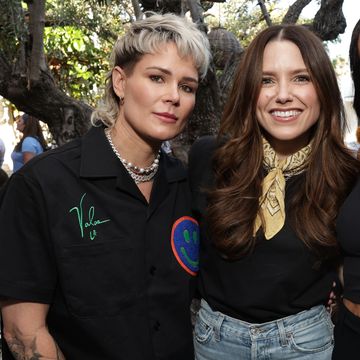If you're reading this, chances are you're trying everything to get over the person you thought was your person. Maybe you’re listening to Taylor Swift breakup songs while you stalk their Instagram—no shame, everyone’s been there. Either way, accepting the fact that you need to move past the relationship is key.
Moving on post-breakup is notoriously tough because reminders of your past relationship seem to be everywhere, says Terri Orbuch, PhD, a professor at Oakland University in Michigan and author of Finding Love Again: 6 Simple Steps to a New and Happy Relationship. “If you were living together or you worked out at the same gym—all of those things remind you of the past,” she says.
And if you thinking getting over a breakup gets easier with age, that's not always the case—plus, the stakes are higher: “Developmentally, most people aren’t ready for long-term commitment until their mid- to-late twenties, at which point there’s much more riding on having a successful relationship,” says Jane Reardon, LMFT, founder of the app Rx Breakup. So it's natural that a breakup at this stage might hit harder.
Meet the experts:
Terri Orbuch, PhD, is a professor at Oakland University in Michigan and author of Finding Love Again: 6 Simple Steps to a New and Happy Relationship.
Jane Reardon, LMFT, is the founder of the app Rx Breakup.
Dr. Sarah Gundle, PsyD, is a psychologist specializing in breakup and trauma therapy based in New York City.
“Part of it is moving past your own feeling of victimhood, says Dr. Sarah Gundle, PsyD, a psychologist specializing in breakup and trauma therapy. “Finding your own responsibility in your own sense of agency is a big part of moving on.”
Fortunately, there is good news: You can and will get over this (and any future) breakup, especially if you make the following moves. I called in the pros to coach you through it.
What is the fastest way to get over a breakup?
For Gundle, the fastest way to get over a breakup is to develop a story of what the relationship meant to you, and make it no longer than a paragraph. “Is this a story about you struggling to give yourself sexual license and you learned that with him and you can take it with you? Is this a story about you trying new things?” In other words, reflect on the relationship and all of the positive things it might have brought you—including anything it taught you.
She also recommends trying to understand what happened—even if that means answering each other’s questions after it all went down. “It's much, much more effective to have two people in the room to do that, but obviously, that's not always possible," she says.
For those of us who can’t get a hold of our ex, or just can’t bear to face them again, either spend some time alone or with a therapist and ask yourself initial questions to start creating the narrative, like: What did this relationship mean to you? How can you locate your responsibility in this?
In the meantime, here are 20 things you can do to help you move on a little every day, brought to you by the pros.
1. Rediscover old interests.
What did you love doing as a teenager? What passions got pushed aside when you made room for your former mate? Reigniting those interests—or what Gary Lewandowski, PhD, a psychology professor at Monmouth University who delivered the TED Talk, “Breakups Don’t Have to Leave You Broken” calls “rediscovery of the self”—is a powerful way to move on since it allows you to reestablish your own identity outside of the one that’s caught up in your partner.
In fact, his research has shown that pursuing dormant interests is a more effective coping mechanism than trying new things, since there’s no guarantee you’ll actually enjoy those new activities or incorporate them into your identity.
2. Eliminate triggers.
Since regular reminders of your ex can deepen your wounds, the obvious solution is to avoid or eliminate them. That means getting rid of furniture, jewelry, clothing, or photos that remind you of your former flame (check out NeverLikedItAnyway.com to sell old gifts), as well as changing your routines. “If you went to Starbucks together, go to a different one,” Orbuch advises. “If you took the 8 a.m. train, take the 7:45 a.m.”
3. Let off steam.
If you're feeling very Carrie Underwood "Before He Cheats" about the situation at the moment, go with that. Try rage yoga, a rage room (literally all the rage), or even a kickboxing class. But make sure you get it all out at the beginning stages of the healing process, Reardon says, because you'll feel better in the end.
"Anger management can be super cathartic, but the sooner you can move through the emotional aspects of the breakup [as in, feeling sad, angry, hurt, devastated] and move on to making sense of what happened and why, the quicker you’ll recover," says Reardon.
4. Cut ties.
While you may feel like talking or meeting up with your partner could help with closure, keeping in touch tends to ultimately prolong the heartache, Lewandowski says. Think about it like a job: “It would be really hard to be good at your new job if you’re still worrying about what’s going on at your old job,” he points out. “You want to be as successful in that next relationship as possible, and you wouldn’t want your new partner to still be obsessed with their previous relationship either, so you shouldn’t be that person.”
And this should go without saying, but...absolutely no, NO breakup sex!
5. Unfollow.
Cutting digital ties is important, too. How important? One study found that people who Facebook stalk their exes are more distressed, harbor more negative feelings, feel a greater sense of longing, and stunt their personal growth more than those who cut social media ties, too.
“By keeping tabs on them electronically, you’re maintaining those connections in a way that’s not healthy for your recovery,” Lewandowski says. “Your best bet is to go cold turkey.” (Yes, that includes Instagram and Snapchat, too.)
6. Do a social media detox.
In addition to stopping with the social media stalking of your ex, taking a break from social altogether can also speed the process. "It makes it infinitely easier to get over a breakup when you have no contact for a few months. That includes social media, so see if you can take a 30-day online hiatus," Reardon says.
It's not just about unfollowing your ex. "I always notice a big setback after someone sees a mutual friend’s post with the ex in the picture, having a great time, of course," she adds. (Isn't that always the case?!) Do yourself a favor and delete Insta from your phone for a week, even, so there's no chance they'll pop up in a random Story. You'll also feel better by spending more time doing than scrolling.
You're not alone! These celebs went through maaajor breakups (in the limelight, at that!):
7. Stop asking friends to check up on your ex.
While you're doing your social media detox, don't have your friends cyber-stalk your ex (or your ex's new fling), either. "It’s best to lay low and heal. Ask your friends not tell you stories about the ex," says Reardon. "It’s information you may want but don’t need to hear."
8. Get off your ex’s Netflix account.
This seems to be a ~digital age~ trend, and it should go without saying, but stop sharing Netflix (Amazon Prime, Hulu, etc.) accounts with your ex after you break up. Research states that staying in contact in any way with a former flame can be damaging to your current relationships, especially if you've already moved on to a new person.
Plus, you don't need to know what they're watching while Netflixing and chilling with their rebound (and they don't need to know what you're watching to get over them, either).
Here's what to watch on your own Netflix account:
9. Do a refresh of your space.
You may have already ditched all evidence of the relationship in the form of your framed photos together and gifts from your ex, and that can actually be healthy. "If the breakup was the ex’s idea, and you have no children, then throw all those pictures and mementos in a bag and put it out of sight," Reardon says.
Take this as an opportunity to give your room or home a little makeover, and add some new accent pieces that will help you make new memories. "Giving your space a little refresh is great self-care—fill in the spaces with something fun or inspiring to see," Reardon adds. After all, that's where you'll be most days during the healing process, so you might as well add only items that spark joy to the place.
10. Make a list of the red flags in the relationship.
One of Reardon's favorite tips from Rx Breakup is the red-flag list: Jot down everything that was an issue in the relationship that you chose to ignore, she says. And scientifically, this may work. A 2018 study found that thinking negative thoughts about your ex, rather than ruminating on why you loved the person, may temporarily put you in a crappy mood, but can help you get over them faster in the long run.
"This can be a total game-changer. Anytime you’re feeling sad or mushy, or like you did something wrong or feeling anything at all, pull out that list of red flags and add to it. It snaps you right back into reality: This may be a super-hard time, but you’re actually better off and probably dodged a giant bullet," Reardon says. It'll take you one step closer to realizing what you deserve in a relationship and how you can have a better one the next time around. "Use the breakup as a major opportunity for personal growth and better self-awareness, so you never have to feel this way again," Reardon adds.
11. Seek therapy to talk things through.
If you're feeling particularly stuck in a period of sadness after the breakup, therapy might help, especially if the way in which the relationship ended is a similar pattern (for example, the partner cheated on you before the breakup).
According to Reardon, there are a few important things you should work on with a therapist to move toward healing. Start by looking at the patterns of the relationships in your life, between family, friends, and other intimate relationships. "A crucial bit of information to look at is how the experience with this partner mirrors other relationships, including the one you have or had with a parent," says Reardon. Once you analyze those and the patterns of your own responses within your relationships, you can move forward toward bettering your relationships.
"It’s said that it takes a traumatic event to affect meaningful change, and a really devastating breakup can be great motivation to disrupt old patterns, resolve old traumas, and honestly look at how you relate to a significant other," Reardon says.
12. Change your “blame statements.”
What story do you tell yourself about why the relationship ended? Orbuch says most people either blame their former partners (“He couldn’t commit.” “She didn’t treat me well.”) or themselves (“I should have never gotten involved.” “I’m not cool enough.”). But to effectively cope, you need to rewrite your story in "we terms." (“We weren’t right for each other.” “We were too young.”) “Any of those statements allow you to let go and reduce emotional baggage thought-wise,” Orbuch says.
13. Turn what you don’t have into what you can do.
Similarly, it’s helpful to change your internal dialogue from one about all the things you’ve lost in the breakup to all the things you’ve gained, experts say. Instead of thinking, I’m so lonely. I’ll never find another partner. What’s going to happen over the holidays? Think about the things you now get to do—whether that’s hanging out more with your friends, making a career move that takes you to another city, or simply appreciating less relationship stress in your daily life.
Lewandowski recommends writing these thoughts down: Research shows that while journaling about the negatives is more helpful than not writing at all, forcing yourself to focus on the positives of your new singlehood is especially effective when it comes to moving on, he says.
14. Write letters to your ex—but don’t send them.
Speaking of writing, Orbuch advises writing a letter or letters to your ex—but don’t stamp it or click send. (Seriously. Don't.) Write down how you feel, how the breakup is affecting you, and anything else you’d hypothetically like to tell that person.
Do it weekly, if you want, so you can record how your emotions are shifting as time goes on and you start to get over the breakup. “It has nothing to do with getting the partner back or telling the partner what’s happening,” Orbuch says. “It’s a way of you getting closure and you letting go of a lot of the emotional baggage connected to the past.”
15. Enlist your fan club.
Immediately after a breakup, social support is crucial, says Orbuch, who suggests reaching out to a best friend, parent, therapist, or anyone else who can reinforce your positive qualities, remind you why the relationship didn’t work out, and otherwise be a loving sounding board for your woes.
Unlike unhealthy coping mechanisms (drinking a lot of alcohol, sleeping all day), “purging that anger and loneliness and frustration in a constructive way is so important,” Orbuch says.
One super-healthy coping mechanism? Cleaning up your diet and exercise—and getting that revenge body you always wanted...
16. Volunteer.
It’s tempting to throw a pity party when you’re mourning the loss of a romantic relationship. And while you’re allowed to feel sad for a stretch, Orbuch recommends getting involved in something like volunteer work to get your head out of your own problems and into something that helps others. Indeed, research has linked volunteering with less depression, more life satisfaction, and enhanced well-being.
My personal suggestion? Volunteer at an animal shelter. You can't not feel better with a happy ball of fur in your arms. Ex-boyfriend, who?
17. Continue with any routines you have to grasp a sense of normalcy.
Just keep on living life, no matter how hard it is, Gundle says. If you two met at a gym, keep going back to that gym so it eventually feels normal again. The repetition of being in a space you once shared will eventually help you stop associating the person with it, even if it takes a while. Sticking to a routine will also ground you and help you realize that you can still live your life without that person.
18. Journal all the ways that you can survive on your own.
Believe it or not, journaling is right up there with working out when it comes to letting off steam after a breakup—at least to me—just in a more introspective way, as recommended by Gundle. Sometimes getting your thoughts out on paper helps you literally see what went wrong, or why they weren’t the right person for you. One great exercise is to write out every way that you can survive on your own. You thrived before them and you’ll thrive after them. It can be as simple as losing their Netflix password, or as big as making a plan on how to be a better budgeter, if this was something you lost track of during the ‘ship.
While you're at it, consider the following questions from Dr. Gundle:
- What don't you miss about your ex?
- In what ways were you a better person around your ex?
- In what ways did they make you a worse person?
- What are you looking for in your next partner? What do you have time for now that you didn't have time for before?
- What do you know about your own resilience because of this breakup?
19. Try not to lose space in your other relationships.
Post-breakup, it’s easy to lose trust in the people around you, especially if you’re the one getting broken up with, Gundle says. When you’re in a relationship, it’s possible to become consumed by another person and have less space for your other relationships, so make sure you never let go of the day ones you have around you.
20. Have self-compassion.
This one is the most important to Gundle. Spend some time working on developing your own self-compassion by thinking through some statements. If you’re talking down to yourself, it’s probably not serving you, so realize why you’re doing it, and accept it. It can be as simple as Gundle's example of saying something to yourself like: “It's no wonder I'm tough on myself, but it’s because of the way I was raised. I would accept someone else who was going through a struggle, so I want to accept my own struggles too,” she says. In the context of your breakup, be on the lookout for self-criticism and self-judgement.
How do you get over a breakup when you still love them?
Try your best to work on yourself by doing the activities above. Eventually, you'll see that there's more to life than *that one person* and you'll be able to feel like yourself again—hopefully sooner, rather than later. It might take time, though, so try not to be frustrated if it's been awhile and you still can't get them off of your mind. Be patient and know that it'll pass. In addition, Gundle recommends asking yourself the following questions to start getting out of the funk:
- Were you and your partner friends? If you weren't, in what ways was your relationship different than the ones you have with your closest friends?
- Did you confide in each other?
- Did you share the same hobbies, attitudes about life, attitudes about politics or children? Why were they the same? Why did they differ?
- In what way did you lose the thread of whether or not you were compatible, goal-wise?
- Did you agree on methods for solving problems?
- How did you argue? When you guys got angry with each other, did you deal with it directly or did you hide it or try to hurt each other?
- Did you share friendships? Did you share responsibilities, both household and also family- and friend-wise?
- Did you make major decisions jointly?
- Did you allow each other alone time?
- What did you keep from the other person?
- Did you trust each other?
- Was the relationship important enough for each of you to make some personal sacrifices for it?
- What were you grateful for in the relationship?
How long do breakups take to get over?
It…varies, sorry. There’s no hard and fast rule—like "half of the length of the relationship"—because each relationship is different.
“I'm a little wary of making formulas like that because some relationships are more complicated than others,” says Gundle. “I think personally it has less to do with time and more to do with the story. We all tell ourselves stories about events that happened and we have to get the story right for us to be able to move past it.”
What are the five stages of a breakup?
The stages of a breakup are similar to the stages of grief, according to Gundle. The first stage is hurt and pain, she says, followed by disbelief. “Like, ‘how could this be happening to me? Like, why is this happening to me?’” she says. The next phase is bargaining, but also anger, she explains, where you might be saying to yourself, “Maybe if I had only done this,” or questioning why it all went down the way that it did.
Afterward is depression and a coming-to-terms of the situation and that it won’t change. The final phase—which Gundle believes is imperative in order to move past a breakup—is a self-reflection of what the story meant to you. “Coming up with your own story, a narrative of what occurred, what it meant to you, and why it happened the way it did, and acceptance,” she says.
You'll start feeling better in no time—just remember who you are and know that your feelings are temporary. You got this!
Anna Lekas Miller is a writer and journalist who covers stories of the ways that conflict and migration shape the lives of people around the world. She has reported from Palestine, Lebanon, Turkey and Iraq, and her work has appeared in Vanity Fair, The Intercept, New Lines Magazine, CNN, and many others. She lives in London with her partner, Syrian journalist Salem Rizk.

Addison Aloian (she/her) is the assistant love & life editor at Women’s Health. Outside of topics related to lifestyle, relationships, and dating, she also loves covering fitness and style. In her free time, she enjoys lifting weights at the gym, reading mystery and romance novels, watching (and critiquing!) the latest movies that have garnered Oscars buzz, and wandering around the West Village in New York City. In addition to Women's Health, her work has also appeared in Allure, StyleCaster, L'Officiel USA, V Magazine, VMAN, and more.















